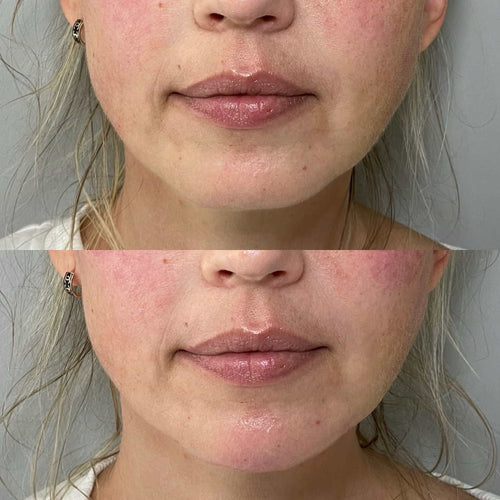What Is A Flaring In Medical Terms?
Reserve Your Dermal Filler Appointment with Dr. Laura Geige Now
What is a Flare?
Definition
In medical terminology, “flare” refers to an unexpected worsening or increase in symptoms of a chronic condition.

This sudden exacerbation can affect various illnesses, including inflammatory conditions like arthritis, lupus, and Crohn’s disease.
A flare might involve heightened pain, swelling, redness, stiffness, fatigue, digestive issues, or other signs specific to the underlying ailment.
The triggers for flares can be diverse and vary from person to person.

Common factors include stress, infections, certain foods, environmental changes, hormonal fluctuations, or even overexertion.
Identifying personal triggers and taking steps to avoid them can help manage flares effectively.
Treatment during a flare typically involves increased medication dosage, rest, and symptom-relieving measures tailored to the specific condition.
Causes of Flares
A flare is an abrupt worsening of symptoms in a chronic condition.
Flare-ups are often unpredictable and can vary in severity from person to person.
Here are some common causes of flares:
- Stress: Physical or emotional stress can trigger immune responses that worsen symptoms.
- Infection: Even a minor infection can lead to a flare-up in some conditions.
- Injury: Trauma to the affected area can cause inflammation and exacerbate symptoms.
- Changes in weather: Some people experience flares related to temperature fluctuations, humidity, or barometric pressure changes.
- Hormonal changes: Fluctuations in hormones, such as during menstruation or pregnancy, can trigger flares in some individuals.
- Certain foods or drinks**: Some people find that specific foods or beverages worsen their symptoms. Common triggers include caffeine, alcohol, and spicy foods.
- Lack of sleep: Inadequate rest can weaken the immune system and make a person more susceptible to flares.
- Overexertion: Pushing oneself too hard physically can lead to inflammation and symptom worsening.
Understanding what triggers your flares is crucial for managing your condition effectively.
Keeping a symptom journal can be helpful in identifying patterns and potential triggers.
Immune System Response
A flare, in medical terms, refers to a sudden worsening or intensification of symptoms associated with a chronic condition.
It’s essentially a period of heightened activity within the body, often characterized by an increase in inflammation and immune system response.
Flare-ups can occur unpredictably, and their triggers vary depending on the specific condition.
Some common factors that can induce flares include stress, infections, dietary changes, hormonal fluctuations, and even weather changes.
The immune system plays a crucial role in flare-ups. In chronic conditions like autoimmune diseases, the immune system mistakenly attacks the body’s own tissues.
During a flare, this autoimmune response intensifies, leading to increased inflammation and damage to affected organs or tissues.
For example, in rheumatoid arthritis, a flare might involve increased joint pain, stiffness, and swelling due to heightened immune activity targeting the joints.
Understanding flares is essential for managing chronic conditions effectively.
Recognizing the triggers and early signs of a flare-up allows individuals to take steps to mitigate its severity and seek timely medical attention.
Environmental Triggers
A **flare** in medical terms refers to a sudden worsening or intensification of symptoms associated with a chronic condition.
This can involve an increase in pain, inflammation, swelling, fatigue, or other characteristic signs and symptoms.
Flares are often unpredictable and can be triggered by various factors.
Understanding the potential triggers for flares is crucial for managing chronic conditions effectively.
**Environmental Triggers:**
Several environmental factors can contribute to flares in different conditions. These include:
***Weather Changes:***
Fluctuations in temperature, humidity, and barometric pressure can impact individuals with conditions like arthritis, fibromyalgia, and migraines.
Rainy or stormy weather is often associated with increased pain and stiffness in those with musculoskeletal disorders.
***Stress:** ***
Emotional stress can trigger the release of hormones that exacerbate inflammation and worsen symptoms. Conditions like irritable bowel syndrome (IBS), autoimmune diseases, and skin conditions can be particularly sensitive to stress.
***Infections:***
Viral or bacterial infections can trigger flares in immune-mediated disorders such as rheumatoid arthritis, lupus, and multiple sclerosis.
These infections can stimulate an overactive immune response that leads to inflammation and symptom exacerbation.
***Allergies:***
Exposure to allergens like pollen, dust mites, mold spores, or pet dander can trigger allergic reactions that manifest as skin rashes, respiratory symptoms, or digestive issues. This is particularly relevant for conditions like eczema, asthma, and allergies.
***Diet: ***
Certain foods can trigger flares in some individuals with chronic conditions. Common culprits include spicy foods, caffeine, alcohol, processed foods, and gluten. Identifying and avoiding these triggers through an elimination diet can be helpful in managing symptoms.
Managing Flares
Lifestyle Modifications
A flare-up, often referred to as a “flare,” is a sudden worsening of symptoms associated with a chronic condition.
These conditions can range from autoimmune disorders like rheumatoid arthritis and Crohn’s disease to skin conditions like psoriasis.
During a flare, inflammation increases, leading to heightened pain, swelling, fatigue, and other characteristic symptoms specific to the underlying condition.
The triggers for flares vary significantly from person to person and can include:
- Stress
- Infections
- Diet
- Environmental factors (e.g., weather changes)
- Lack of sleep
- Medications
Recognizing individual triggers is crucial for managing flares effectively.
Lifestyle modifications play a vital role in minimizing flare frequency and severity. These modifications aim to create an environment that supports the body’s natural healing processes and reduces inflammation.
Here are some key lifestyle changes that can help manage flares:
1. **Stress Management:**
Stress is a common trigger for many chronic conditions. Incorporating stress-reducing techniques like yoga, meditation, deep breathing exercises, or spending time in nature can significantly impact flare frequency.
2. Regular Exercise:
Moderate exercise, tailored to your individual condition, has anti-inflammatory effects and can improve overall health and well-being. Consult with a healthcare professional to determine appropriate exercises for your specific needs.
3. **Balanced Diet:**
A nutritious diet rich in fruits, vegetables, whole grains, and lean protein provides essential nutrients to support the immune system and reduce inflammation. Some individuals may find benefit from eliminating trigger foods like processed foods, sugar, or alcohol.
4. Adequate Sleep:
Sleep deprivation weakens the immune system and increases inflammation. Aim for 7-8 hours of quality sleep each night to promote healing and reduce flare risks.
5. Medication Adherence:
It is crucial to take prescribed medications as directed by your healthcare provider. Consistent medication use can help control inflammation and prevent flares.
6. Regular Check-Ups:
Maintaining regular appointments with your doctor allows for monitoring of your condition, early detection of potential flare-ups, and adjustment of treatment plans as needed.
By implementing these lifestyle modifications, individuals can empower themselves to manage their chronic conditions effectively and minimize the impact of flares on their lives.
Medications
A flare-up, often referred to as a “flare,” is a sudden worsening of symptoms in a chronic condition. It’s an increase in the severity of existing signs and symptoms, typically beyond the usual baseline.
These episodes can be triggered by various factors, including:
- Stress
- Infection
- Injury
- Changes in weather
- Certain foods or medications
Understanding the potential triggers of your specific condition is crucial for managing flares effectively.
Medications play a vital role in managing chronic conditions and preventing or minimizing flares. Here’s a breakdown of common medication types used:
- Disease-Modifying Anti-Rheumatic Drugs (DMARDs): These drugs are typically used for autoimmune diseases like rheumatoid arthritis, lupus, and psoriasis. They work by suppressing the immune system, reducing inflammation and preventing joint damage.
- Biologics: This class of medications targets specific inflammatory molecules in the body. Biologics can be effective for treating various conditions, including rheumatoid arthritis, Crohn’s disease, and psoriatic arthritis.
- Nonsteroidal Anti-Inflammatory Drugs (NSAIDs):** These over-the-counter or prescription drugs reduce pain and inflammation. Examples include ibuprofen, naproxen, and celecoxib.
- Corticosteroids: Powerful anti-inflammatory medications that can be administered orally, intravenously, or topically. They are often used to manage acute flares but should not be used long-term due to potential side effects.
Consult with Dr. Laura Geige for Dermal Fillers Today
The specific medication regimen will depend on the individual’s condition, its severity, and other health factors. It’s essential to work closely with a healthcare provider to determine the most appropriate treatment plan.
Decléor Direct Cycle for Azaylia Press on Honey Lace and Scotch Decléor Direct
Book a Dermal Filler Appointment with Dr. Laura Geige Today
- Why CBD Gummies Are Popular For Reducing Chronic Pain - November 10, 2025
- What Is The Best Lip Filler To Use - November 8, 2025
- What Are The Benefits Of Full-Spectrum CBD Gummies For Mental Health - November 7, 2025